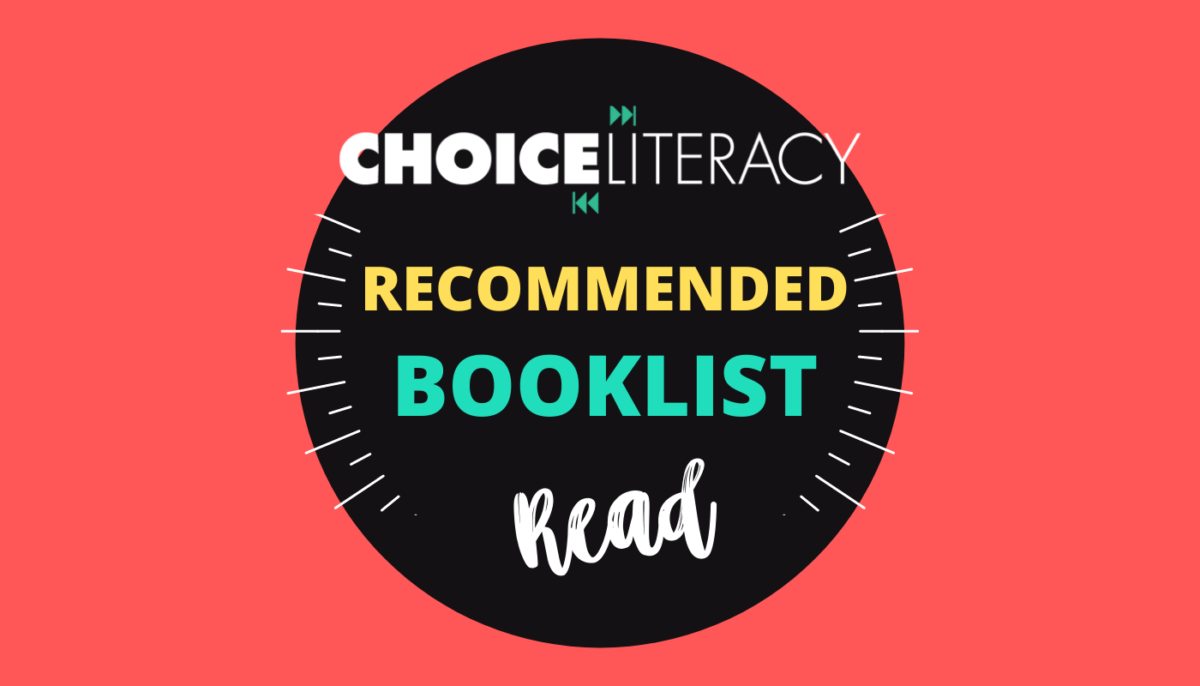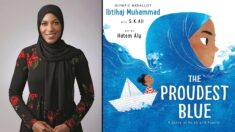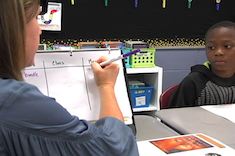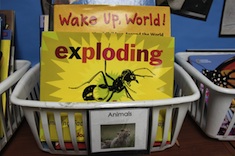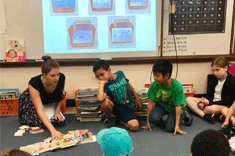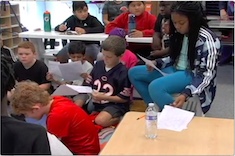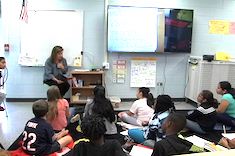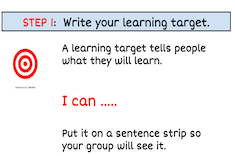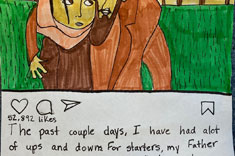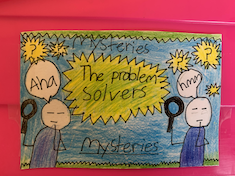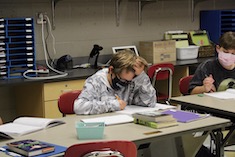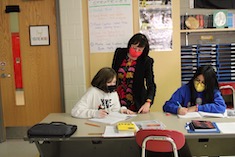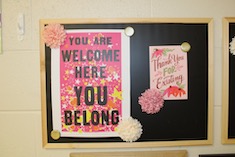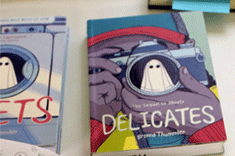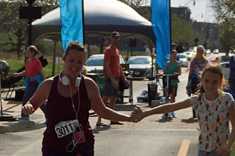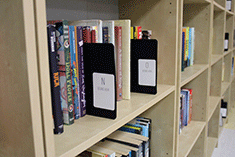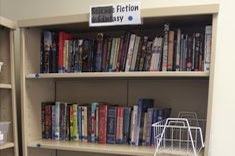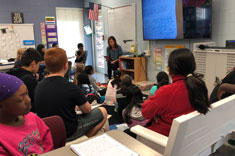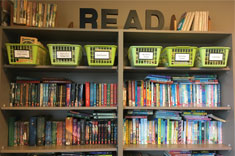6th
Latest Content
Poems to Start the Year
Tara Barnett and Kate Mills share poems to start the year that touch a variety of needs, from building community to connecting with colleagues to hosting parents for back-to-school night.
Honoring Student Identity (Download a Survey)
Tara Barnett and Kate Mills share their authentic process for expanding their beginning-of-the-year student survey to make it more open for all students.
Creating a Classroom Emotional Intelligence Charter
Mandy Robek outlines the process for creating a class Emotional Intelligence Charter. She includes a booklist to help students expand their vocabulary of different emotions.
Befriending Characters in Times of Grief (Booklist)
Melissa Quimby shares a booklist that offers comforting characters to befriend in times of grief. This is a staple for all classrooms.
Bring Me Something Funny (Booklist)
Cathy Mere offers a booklist in response when a teacher asks her to “Bring me something funny.” These books are sure to fill your classroom with lighthearted laughter.
Using The Proudest Blue in the Classroom
Tara Barnett and Kate Mills share three ways using The Proudest Blue by Ibtihaj Muhammad empowers and strengthens readers in all grades.
Studying Character in Intermediate Grades
Dana Murphy leads us in a step-by-step process to take tried-and-true reading strategies to a more sophisticated level to support students as they grow in interpretation.
Creating Thematic Text Sets for Inquiry
Stephanie Affinito guides us to carefully curate text sets so that not only are they suited to students’ interests, but students are guided through the sequence of reading them. There’s no better way to launch students’ curiosity and reading motivation!
A Collection of Treasured Life Lessons
Melissa Quimby leads her students in rich thinking about life lessons and encourages them to treasure the wisdom from books.
Deepening Discussion with a Circle Process
Jen Vincent strengthens the authenticity of a share session in writing workshop by building and tending to relationships that honor a circle process that originated in Indigenous communities.
Determining Importance in Fiction
Dana Murphy guides us in listening and responding to students during strategy-building lessons to grow readers. In this example, she shows the complexity and nuances of direct instruction to build comprehension strategies.
Student-Led Reading Seminars
Tammy Mulligan organizes her second graders to teach reading seminars to their peers. She outlines the steps to make this engaging practice a reality in any classroom.
A Perfect Opportunity for Choice: Showing Theme
Tara Barnett outlines ways to offer choices for students to show their understandings of a book’s theme. Download a choice board and rubric.
Celebrating Reading Identities in the Elementary Classroom
Melissa Quimby offers a creative and practical idea to get to know students’ reading identities.
Status of the Class for Readers and Writers
Matt Renwick reflects on the importance of building students’ identities as readers and writers and the power of a daily status of the class. Download a template to put this routine in place in your own classroom.
Giving Feedback to Energize Writers
Josie Stewart and Hannah Tills ponder the importance of energizing writers with feedback. They offer tips to ensure feedback uplifts writers.
Quick Take: Using Mailboxes for Private Feedback
Christy Rush-Levine shares her system for streamlining passing papers and offering a place for private feedback.
Using Images for Rehearsal in Persuasive Writing
Melanie Meehan makes a case for the power of pictures to provide a foothold and access point for students to enter the writing pathway. She shares an example of using images to engage in persuasive writing strategies.
Opinions! Everybody Has One
Leigh Anne Eck shares a tool to help students develop their persuasive voices, build community, and expand their perspectives. Included is a download to put opinion journals to work in your classroom.
Honoring Student Choice in a Teacher-Chosen Text
Tara Barnett and Kate Mills offer practical and engaging choices to students when reading a teacher-selected whole-class text. Download the reading choices survey and a sample pacing calendar to offer your students more choice during a whole-class read.
What Criteria Should We Use When Selecting Whole-Class Texts?
Christy Rush-Levine reminds us that text selection affects students. By shaping a unit of study to contain texts of varying formats and representing a wide variety of characters, students are empowered to develop their own ideas even while reading a whole-class text. Download a diverse text list to deepen a discussion of how family shapes identity.
Tips for Selecting Inclusive Texts
Hannah Tills and Josie Stewart challenge themselves to select more inclusive texts so all students feel as though they belong. They offer six suggestions to help us examine our bookshelves, thinking, and curriculum.
Book Talk: Sheets and Delicates by Brenna Thummler
Christy Rush-Levine pairs Brenna Thummler’s books Sheets and Delicates in a book talk for her sixth-grade class.
The Reluctant Marathoner: Reflecting on Student Engagement
Gretchen Schroeder uses her reluctance as a marathon runner to reflect on how to encourage more engagement in reading and writing.
Quick Take: Simple Classroom Library Organization
Christy Rush-Levine shares her simple system for organizing her massive classroom library.
Leading Students Toward Underused Sections of the Classroom Library
Gretchen Schroeder intentionally leads students to “jilted genres” in her classroom library.
The Seasons of Classroom Libraries
Melissa Quimby shifts her classroom library throughout the year so that as her students grow as readers, her library will continue to nourish them.
Formative Assessment From Share Sessions
Ruth Ayres outlines different kinds of share sessions and different formats for the share, including some that take advantage of technology.
Write Like Nancy
Inspired by a stranger on a walk, Jen Court clarifies the importance of sharing our writing lives with others. She identifies three important qualities of a writing community.
Expanding Book Choices for Secondary Readers
Ruth Ayres challenges us to be more open to the books that live in our secondary classroom libraries. She contends that committing to supporting choice in independent reading means rethinking some of the restrictions we put on adolescent readers.
Browse Content By
Type
Category
- Assessment Tools
- Big Fresh Archives
- Booklists
- Choice Numeracy
- Classroom Design
- Common Core
- Community Building
- Conferring
- Content Literacy
- Digital Literacy
- English Language Learners
- Equity
- Family Relations
- Free Samples
- Guiding Groups
- Leadership
- Literacy Coaches
- Mentor Texts
- Minilessons
- New Teacher Mentors
- Podcasts
- Poetry
- Quote Collections
- Reading Strategies
- Self Care
- Struggling and Striving Learners
- Talking and Listening
- Teacher Study Groups
- Teaching Reading
- Teaching Writing
- Word Study and Vocabulary
Author
- Melissa Quimby
- Nawal Qarooni
- Gwen Blumberg
- Julie Cox
- The Lead Learners
- Hannah Tills
- Josie Stewart
- Ruth Metcalfe
- Mallory Messenger
- Becca Burk
- Jodie Bailey
- Vivian Chen
- Mary Brower
- Tiffany Abbott Fuller
- Stephanie Affinito
- Ruth Ayres
- Leigh Anne Eck
- Heather Fisher
- Shari Frost
- Julie Johnson
- Suzy Kaback
- Gigi McAllister
- Shirl McPhillips
- Melanie Meehan
- Cathy Mere
- Debbie Miller
- Tara Barnett and Kate Mills
- Tammy Mulligan
- Dana Murphy
- Bitsy Parks
- David Pittman
- Brenda Power
- Heather Rader
- Matt Renwick
- Mandy Robek
- Christy Rush-Levine
- Gretchen Schroeder
- Jen Schwanke
- Brian Sepe
- Katherine Sokolowski
- Stella Villalba
- Jennifer Vincent
Grade Level
Choice Literacy Membership
Articles
Get full access to all Choice Literacy article content
Videos
Get full access to all Choice Literacy video content
Courses
Access Choice Literacy course curriculum and training




